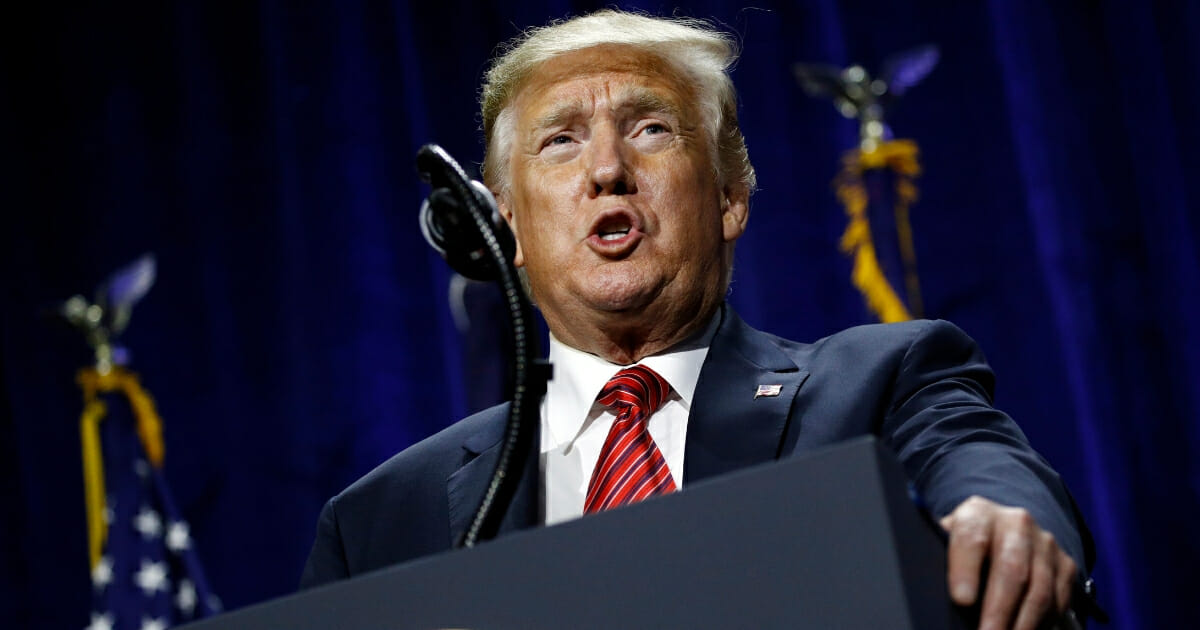
Trump Asserts Executive Privilege over Congress-Subpoenaed Docs
President Donald Trump asserted executive privilege Wednesday in his battle with the House Oversight and Reform Committee over a 2020 census question that asks Americans if they are citizens.
The committee had been planning to hold Attorney General William Barr and Commerce Secretary Wilbur Ross in contempt of Congress if documents the panel demanded by subpoena were not produced.
Democrats are trying to learn who wanted the question added.
Republicans have downplayed the importance of the issue.
JUST IN: Attorney General William Barr says the Trump administration intends to invoke executive privilege over material connected to the 2020 census sought by Democrats on the House Oversight Committee.
— NPR (@NPR) June 12, 2019
Assistant Attorney General Stephen E. Boyd had warned the panel Tuesday that the assertion of executive privilege might come if the contempt vote was held.
Committee Chairman Rep. Elijah Cummings, a Maryland Democrat, had said he would not delay the vote, triggering a letter from Boyd to the panel on Wednesday.
“By proceeding with today’s vote, you have abandoned the accommodation process with respect to your requests and subpoenas for documents concerning the secretary’s decision to include a citizenship question on the 2020 census,” Boyd wrote, according to The Hill.
“The executive branch has engaged in good-faith efforts to satisfy the legislative needs of the committee. Moreover, until the committee’s abrupt decision to seeks a contempt resolution, the department was prepared to provide a significant number of additional documents responsive to the committee’s April 2, 2019 subpoena,” Boyd wrote.
Boyd said the Democrat-dominated committee chose confrontation over cooperation.
“Unfortunately, rather than allowing the department to complete its document production, you have chosen to go forward with an unnecessary and premature contempt vote,” he wrote.
Among the documents protected by Trump was one from the Justice Department to the Commerce Department, which oversees the census, asking that the citizenship question be part of the census in 2020.
“As I indicated in my letter to you yesterday, this protective assertion ensures the president’s ability to make a final decision whether to assert privilege following a full review of these materials,” Boyd wrote Wednesday.
The Commerce Department also told the panel of Trump’s decision.
“The department regrets that you have made this assertion necessary by your insistence upon scheduling a premature contempt vote,” Charles Rathburn, the Commerce Department’s acting assistant secretary for legislative and intergovernmental affairs, wrote.
The action had been foreshadowed Tuesday night in a letter from Boyd to the committee, according to The Washington Post reported.
“In the face of this threatened contempt vote, the Attorney General is now compelled to request that the President invoke executive privilege with respect to the materials subject to the subpoena to the Attorney General and the subpoena to the Secretary of the Department of Commerce,” Boyd wrote.
“I hereby request that the Committee hold the subpoenas in abeyance and delay any vote on whether to recommend a citation of contempt for noncompliance with the subpoenas, pending the President’s determination of this question.”
Cummings has said the refusal to give the panel what it wants is part of the Trump administration’s refusal to work with Congress.
“[The Justice Department] has made very clear that they will not produce the key documents that we have identified as priorities,” Cummings said Wednesday, ABC News reported.
“This does not appear to be an effort to engage in good faith negotiations or accommodations, instead it appears to be another example of the administration’s blanket defiance of Congress’ constitutionally mandated responsibilities.”
Adding a question about citizenship on the next census provoked a partisan fight, with Democrats claiming it might reduce responses to the census from illegal immigrants, who are often clustered in major metro areas.
Because census population counts are used as a major means of allocating federal funds, a census undercount could mean a major fiscal price tag for any community.
A lawsuit aimed at blocking the question has reached the Supreme Court, which is expected to rule this month on whether the question can be used, CNN reported.
Truth and Accuracy
We are committed to truth and accuracy in all of our journalism. Read our editorial standards.
Advertise with The Western Journal and reach millions of highly engaged readers, while supporting our work. Advertise Today.












